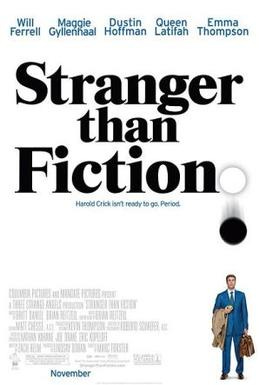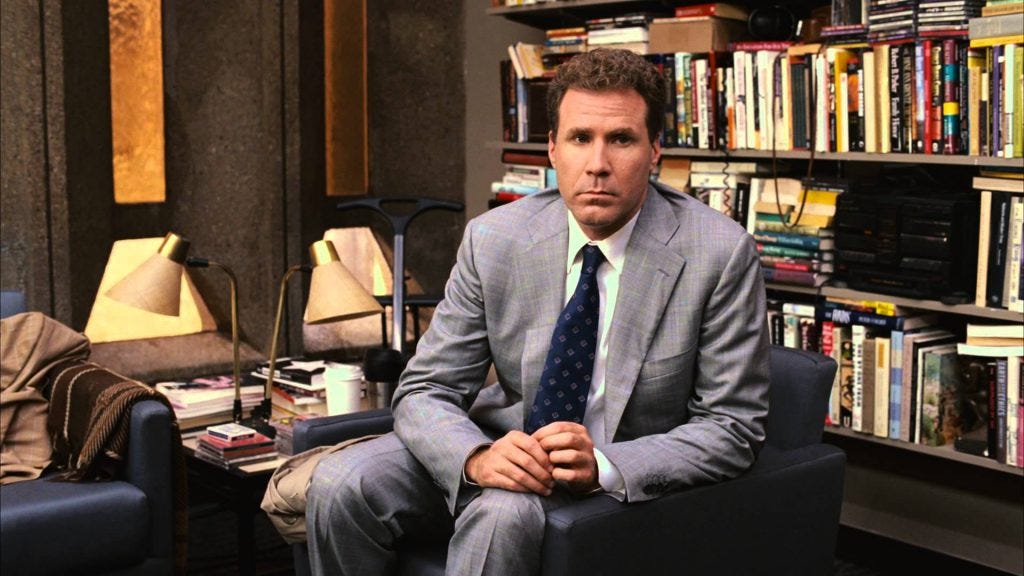Stranger Than Fiction. Directed by Marc Forster, featuring Will Ferrell, Maggie Gyllenhaal, Dustin Hoffman, Emma Thompson, Queen Latifah, and Tony Hale. Columbia Pictures, 2006.
What is wrong with you? Hey, I don’t want to eat nothing but pancakes, I want to live! I mean, who in their right mind in a choice between pancakes and living chooses pancakes?
Stranger Than Fiction consistently rates among my top movies. It’s rewatch value is immense, even once you know the “twist.” That says loads about the story’s quality and the director’s success. There isn’t a way to talk about it that doesn’t involve spoilers, so let the reader beware.
It’s most often described as a romantic comedy, but it accomplishes much more than that. Will Ferrell turns out a fantastic performance as Harold Crick, the meek IRS agent who finds his life spun out of control when a voice tells him he is going to die. He seeks the help of the eccentric Professor Hilbert, played by Dustin Hoffman. The Professor, who specializes in literary theory, tries to help Harold sort out the right and wrong ways to handle discovering you are a character in your own story. As Harold gets closer to meeting his narrator, the extremely depressed Karen Eiffel (Emma Thompson), he finds a best friend at work and falls in love with a woman he’s auditing. In the end, Harold learns a valuable lesson about life and makes a sacrifice that elevates his story out of the realm of simple sappiness.
The movie deals heavily with the notion that we are not in control of how our lives end, or even the path that leads to that end. This concept drives the movie and provides the substance that keeps the movie from becoming sentimental drivel. There are two main ideas worth drawing out.
The movie grapples with a common misconception about God and Christianity.
At the same time, the movie beautifully illustrates a foundational Christian belief.
While the two things appear at odds, I think by juxtaposing them a great truth can be learned.
The Misconception
After meeting Ana Pascal, the female protagonist of the film, Harold tries to confront the voice that is destroying his sanity.1 “Shut up,” he bellows in front of Ms. Pascal’s bakery while staring into the sky. Karen Eiffel, narrating her part in his life, remarks: “cursing the heavens in futility.” Eiffel has power over Harold’s life, beyond simply determining when he dies. While there are moments where it is hard to tell if Karen is writing the story, or if the story is dictating to Karen what to write, the ultimate power lies in Eiffel’s hands. Or more appropriately, her fingers. She must decide whether to end Harold Crick’s life, just as she has plotted out many of the events that make up his life. It doesn’t seem like she writes all the details which gives Harold some semblance of choice. For instance, there is no narration once Harold tells Ms. Pascal he how he feels about her. Yet no matter what decisions Harold makes, bad ones or good ones, he is still subject to Eiffel’s overarching decisions. In effect, she represents how many people perceive God. He authors our lives, while the day-to-day decisions seem to be left up to us. As Professor Hilbert reminds Harold, “you don’t control your fate.” This brings me to the misconception I mentioned earlier.
When Harold decides to make the sacrifice that changes his life, and the lives of everyone in the film, Karen Eiffel is left with a hard decision. As she is talking with Professor Hilbert about the ending of her book, she asks him:
If a man does know he’s about to die and dies anyway. Dies . . . dies willingly, knowing that he could stop it, then . . . I mean, isn’t that the type of man who you want to keep alive?
This scene conjures the idea sometimes argued that Jesus did not have to die for Man’s sin. Watching it, you might hear a voice saying, “I never asked Jesus to die for me,” or “Only a cruel god would require a good person’s life.” But sometimes a sacrifice is what is needed. In fact, for every soul that has ever walked this earth, a sacrifice is exactly what is required. The heart of this world will always lead people to this question. Behind the mystery of this life is an answer that palpitates with all the energy and life that can be found in God through Christ. Because as much as it may confuse and irritate some, Christ’s life and death is a boon to the life of everyone who will seek it. And even if Karen Eiffel is confused, sometimes a death is precisely what saving a life requires.
The Manifestation
What the movie gets wonderfully right, and makes the movie even more worth watching, is seen in Harold’s sacrifice. Unfortunately, I don’t know how to explain this without giving away the ending of the film. If you would prefer to watch the movie first, then you shouldn’t read any further.
Harold’s sacrifice is where the beauty of the film lies.
Harold agrees to die. Despite all the wonderful changes he has experienced, the joy of love, the comfort of friendship, and all that life can offer, he decides there is something far more important than his individual happiness: the life of someone else. Harold willingly marches to his death, determined to do what was right. And in these decisions, the beauty of Christianity is seen, because by giving up his life, he gained a life that was more than he already had. It may be true that “a watch saved Harold Crick,” but there is something more here than simple plot devices.
As long as Harold tried to hold onto his life, this new thing that he realized was so much more than just existing, the more determined his fate seemed. When Harold only thought of himself, he seemed destined to die at the hand of some mysterious power that he didn’t understand. But once he realized that dying was a necessity, and even more, that his death would give life to someone else, he understood. He moved from self-preservation to obedience. And it is through that understanding that Harold changes everyone around him. Ana Pascal finds a person to love rather than a cause as she feeds him Bavarian sugar cookies in the hospital. Karen Eiffel is freed from a world of depression and death, finding that there is more to life than simply writing about people who do not know how to life their lives. Professor Hilbert, too, realizes that he must follow his own advice and is last seen jumping into the pool that he has sat beside and watched throughout the film. All because Harold realizes one of the most foundational teachings of Jesus Christ: “love thy neighbor as thyself.” Harold did not want to die. But because he does not want someone else to die, he ultimately lives.
For whoever wishes to save his life will lose it; but whoever loses his life for My sake will find it. (Matthew 16:25, NAS95)
And who does Harold save? A young boy, echoing more of Jesus’ teaching…
Truly I say to you, to the extent that you did it to one of these brothers of Mine, even the least of them, you did it to Me. (Matthew 25:40, NAS95)
Basically, whether he knows it or not, Harold Crick indeed serves the kingdom of heaven.
Putting these two ideas together in a film, I think demonstrates a great desire in our society. Jesus’ truths ring so true in our hearts, even if we cannot imagine living our lives truly for a God that we cannot fathom. We are afraid that we will turn out to be wrong, or maybe even that we’re right. But as Harold Crick learns, a person cannot live a full life paralyzed by fear.
The closing narration of the film speaks to the little bit of truth that this film has to offer anyone who watches it, and so I will close with that.
As Harold took a bite of Bavarian sugar cookie, he finally felt as if everything was going to be ok. Sometimes, when we lose ourselves in fear and despair, in routine and constancy, in hopelessness and tragedy, we can thank God for Bavarian sugar cookies. And, fortunately, when there aren’t any cookies, we can still find reassurance in a familiar hand on our skin, or a kind and loving gesture, or subtle encouragement, or a loving embrace, or an offer of comfort, not to mention hospital gurneys and nose plugs, an uneaten Danish, soft-spoken secrets, and Fender Stratocasters, and maybe the occasional piece of fiction. And we must remember that all these things, the nuances, the anomalies, the subtleties, which we assume only accessorize our days, are effective for a much larger and nobler cause. They are here to save our lives. I know the idea seems strange, but I also know that it just so happens to be true.
Ana’s name is also significant. Named after a French mathematician who is most famous for his theological work, Pensées, Blaise Pascal embodied the Jansenist Catholic belief that life was ordered by God. In a film where numbers arrange life and the time we have in life is dwelt upon, Pascal’s aphorism #205 fits well alongside the story:
When I consider the short duration of my life, swallowed up in the eternity before and after, the little space which I fill and even can see, engulfed in the infinite immensity of spaces of which I am ignorant and which know me not, I am frightened and am astonished at being here rather than there; for there is no reason why here rather than there, why now rather than then. Who has put me here? By whose order and direction have this place and time been allotted to me? Memoria hospitis unius diei prætereuntis*.”
Blaise Pascal. Pensées. Edited by Mortimer J. Adler and Robert McHenry. Translated by W. F. Trotter. Second Edition. Vol. 30. Great Books of the Western World. Chicago: Encyclopædia Britannica, Inc., 1990. 211.
*[“like the memory of a day guest, passes by.” Cf. Wisdom of Solomon 5:15. David A. deSilva. The Lexham Old Testament Apocrypha: A New Translation. Edited by Douglas Mangum, Lynsey Stepan, and Kelsey Matthews. Bellingham, WA: Lexham Academic, 2023].








I remember watching this and being so surprised by how much I enjoyed it. Will Ferrell is one of my least favorite actors so I was not excited when Rob wanted to watch this years ago but now it is always on the list of movie recommendations when people ask for ideas on something to watch.
I enjoyed reading your thoughts on it too.